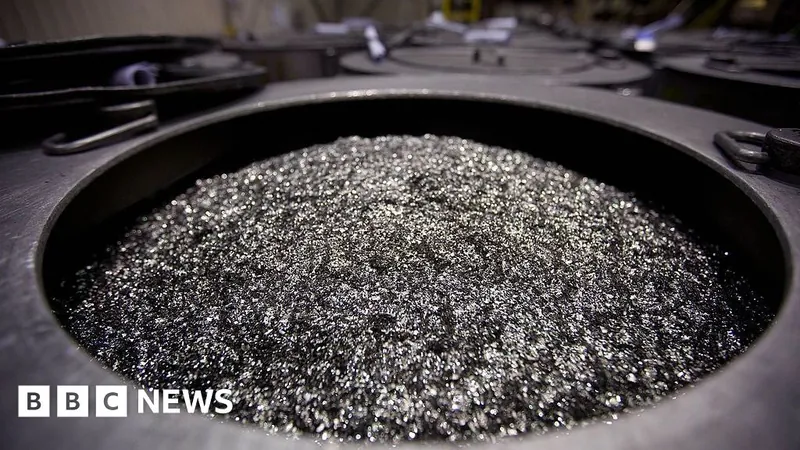
China’s Export Controls on Rare Earths: A Game-Changer for the U.S.
2025-04-17
Author: Emily
The Rare Earths Dilemma: A Heavy Blow to U.S. Interests
As tensions escalate in the trade war between China and the United States, one of the most significant weapons in China’s arsenal is its control over rare earth elements, vital for various high-tech industries. Recently, China launched export controls on critical rare earth minerals, sending shockwaves through American manufacturing and defense industries.
What Are Rare Earths and Why Do They Matter?
Rare earth elements (REEs) consist of 17 chemically similar elements crucial for the production of everything from smartphones to advanced military equipment. While these elements are plentiful in the Earth’s crust, they are termed 'rare' due to the difficulty of extraction and refining. For instance, Neodymium is essential for strong magnets found in electric vehicles and electronics, while Yttrium and Europium are key for vibrant screens in televisions and computers.
"If it runs on electricity, it probably depends on rare earths," says Thomas Kruemmer, a global trade expert.
China’s Dominance in Rare Earth Supply
China controls an overwhelming majority of the rare earth supply chain—accounting for around 61% of production and a staggering 92% of processing, according to the International Energy Agency. This near-monopoly has allowed China to dictate terms and conditions to global industry players. The extraction and processing of rare earths present significant environmental challenges, making other nations hesitant to ramp up production.
China's Strategic Export Restrictions
In retaliation for U.S. tariffs, China has imposed restrictions on seven crucial rare earth minerals, primarily 'heavy' rare earths used extensively in defense technologies. Under new regulations, exporters must obtain special licenses to ship these elements out of China, significantly raising the stakes for American manufacturers reliant on these imports.
The U.S. Under Threat: Economic and Defense Implications
The loss of access to Chinese rare earths could cripple U.S. industries. Reports show that between 2020 and 2023, the U.S. imported approximately 70% of its rare earth needs from China. This is particularly alarming for the defense sector, where critical systems such as F-35 jets and radar heavily rely on these materials. Moreover, manufacturers may face production delays and skyrocketing costs as prices for rare earth materials soar.
A Call to Action: The U.S. Must Diversify its Supply Chains
Recognizing the vulnerability, President Trump has initiated investigations into the national security risks stemming from heavy reliance on foreign rare earths. The administration is keen on promoting domestic mining and processing capabilities, although this requires substantial investment and innovation.
Can America Regain Its Rare Earth Independence?
Currently, the U.S. has limited rare earth production capability, with existing mining operations unable to process heavy rare earths independently, forcing reliance on China for further refinement. Efforts to explore other sources, such as Ukraine and Greenland—home to significant reserves—are underway, but geopolitical tensions complicate these aspirations.
The Bigger Picture: Navigating a Turbulent Policy Landscape
The intricacies of U.S.-China relations present a dual challenge: alienating China, which possesses the essential rare earth resources, while also jeopardizing long-standing international partnerships through aggressive trade policies. Experts warn that the future will largely depend on the U.S.'s ability to navigate this complex environment and secure a sustainable supply of critical minerals essential for national security and technological advancement.









 Brasil (PT)
Brasil (PT)
 Canada (EN)
Canada (EN)
 Chile (ES)
Chile (ES)
 Česko (CS)
Česko (CS)
 대한민국 (KO)
대한민국 (KO)
 España (ES)
España (ES)
 France (FR)
France (FR)
 Hong Kong (EN)
Hong Kong (EN)
 Italia (IT)
Italia (IT)
 日本 (JA)
日本 (JA)
 Magyarország (HU)
Magyarország (HU)
 Norge (NO)
Norge (NO)
 Polska (PL)
Polska (PL)
 Schweiz (DE)
Schweiz (DE)
 Singapore (EN)
Singapore (EN)
 Sverige (SV)
Sverige (SV)
 Suomi (FI)
Suomi (FI)
 Türkiye (TR)
Türkiye (TR)
 الإمارات العربية المتحدة (AR)
الإمارات العربية المتحدة (AR)